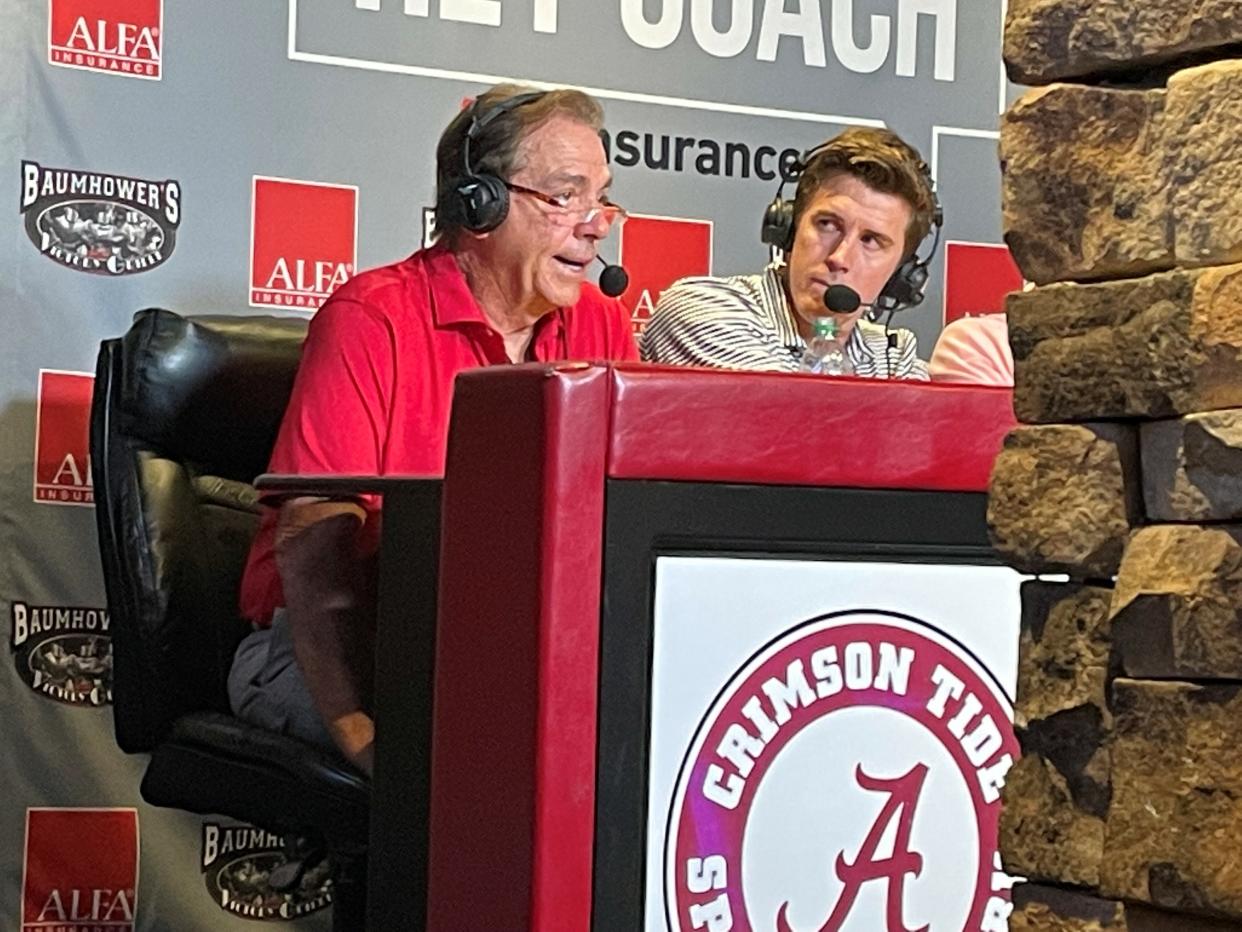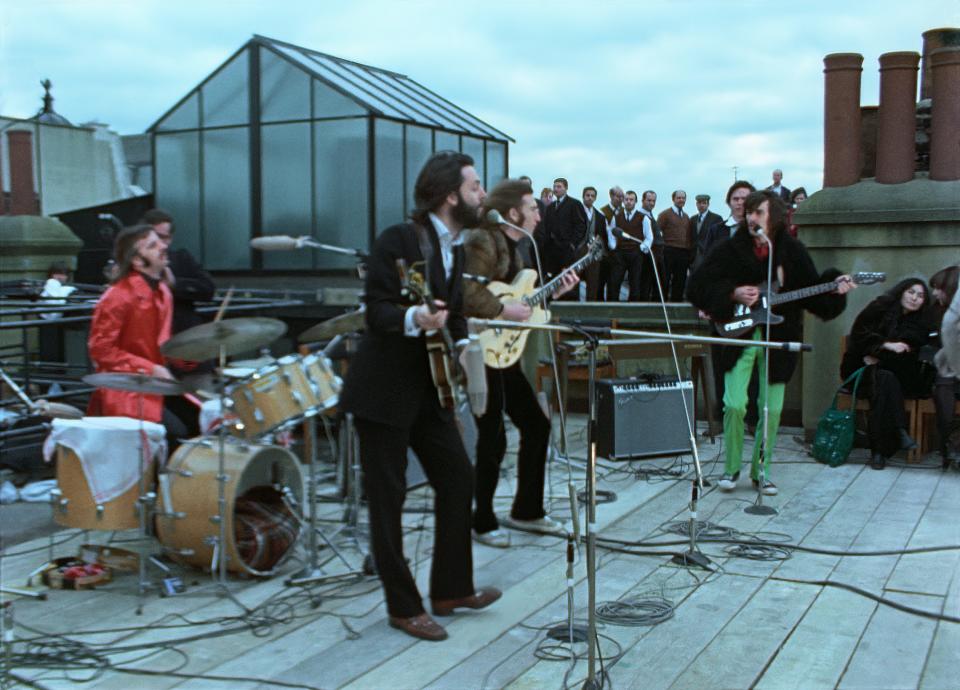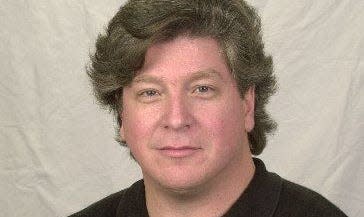MARK HUGHES COBB: The kids get back to where they once belonged

- Oops!Something went wrong.Please try again later.
- Oops!Something went wrong.Please try again later.
- Oops!Something went wrong.Please try again later.
- Oops!Something went wrong.Please try again later.
Just kids. Are we talking about:
A) The University of Alabama football team, according to coach Nick Saban
or
B) The musicians in Peter Jackson's epic "The Beatles: Get Back" documentary?
Answer: C) Both.
On his pre-Thanksgiving radio show, coach Saban went on a tear about the Crimson Tide's fair-weather fans who expect not only a victory, but a blowout every game, and was pretty much spot-on.
I do wish he'd lay off the "rat poison" he's become so fond of, tarring "the media" with a miles-broad brush, especially given his kind words on the tragic passing of our longtime colleague and friend Cecil Hurt.
But I'm sure he didn't mean us, right? Just "the media."
He might also ponder the fact that rat poison is beneficial, or at least helpful: It kills rats. It's not poison FROM rats, which would be terrifying indeed.
Still, his other points were sound: Alabama fans are spoiled rotten.
“We’re going to get everybody’s best game,” Saban said. He went on: "Our players work their butt off to be the best that they can be, and to get criticized for what they work hard for to do, so that you can be entertained. So you can have joy, pride and passion for what they do. ...This is not professional football. These guys aren’t getting paid to play here. They’re representing you all. You should be proud and happy to support them and appreciate what they do and have some gratitude."
Sound argument, except for the suggestion that getting criticized falls out of bounds. That's part of the trade-off for playing in public. Ask any musician, actor, singer, dancer, etc. Just throwing your heart into a thing doesn't grant immunity. Can't tell you how many times I've heard rebuttals along the lines of "But he/she/they worked so hard!"
Yes, and ...? If you're not doing the thing for love of the thing, then why?
It's apparently not for the pay, though the best of the best might make a lucrative career, either as a pro player, or from using Alabama's virtually endless national "rat poison" coverage to build name recognition they can trade on, creating a business, or pursuing some other life dream. The game may pay off, long run.
But I'll go in 100 percent with being proud, and expressing gratitude. That holds true for artists who also feel slighted: We should all be thrilled to live and thrive in such a diverse, creative and engaging community, stemming from the university at its heart.
It's easy to celebrate wins. What matters is how we support the kids – and yes, despite their awe-inspiring fitness levels, these are still kids – when things aren't looking great. After Texas A&M, they needed cheering. Going late into the fourth quarter down at Jordan-Hare, they needed cheering.
Attempting to wind down from that four-overtime squeaker, I turned to another, only slightly older, and also fairly successful, group of kids.
John Lennon and Ringo Starr were 29, Paul McCartney was 27, and George Harrison 25 when the filming that became Jackson's "Get Back" was taking place, in and around Apple Corps, and in ill-fated Twickenham Studios.
Just kids, who'd broken the musical world and re-invented it. Before any of them was 30, they'd already cut the so-called white album, "Sgt. Pepper's Lonely Hearts Club Band," "Revolver," "Rubber Soul," "Magical Mystery Tour," "A Hard Day's Night," "Help" and "Yellow Submarine," the latter three soundtracks from feature films starring the Fab Four. And all that in what, six years? Not to mention a slew of earlier singles, collections and albums with varying names, according to where in the world they were released.
At Twickenham, the boys felt disconnected, swallowed up by the vastness, discomforted by the lack of heating, and discombobulated by the pretense of director Michael Lindsay-Hogg, who claimed over and over to be a fan, but seemed intent on pushing the boys into things they'd little interest in, including a TV special, outdoor concerts – he keeps yakking about an amphitheater in Libya – and whining that there's no movie here.

Oh, there's a movie. It just took Jackson and team, restoring and re-editing hundreds of hours of raw footage recorded in January 1969, to make it happen. Lindsay-Hogg did cut and release a film called "Let It Be," but Jackson's work on the three-part "Get Back," streaming on Disney Plus, unveils a more thorough, nuanced story across seven hours and 48 minutes. He could have cut Lindsay-Hogg out, and there'd be little missed. That wheedling outsider presence seems as much a problem as any internal friction.
That was there, of course, but "Get Back" shows us four old friends, an extended family, playing, writing and recording live together, trying to find some of the old magic of The Cavern Club, or even back to long days and nights in Hamburg.
Despite clear signs of division – George walks out, tired of being treated like a junior partner; John praises manager Allen Klein, who'd pursued the band for years; Ringo sits forlorn, like the youngest child watching big brothers feud – there's a lot more going on. John and Paul do slight George, a bit, but you see why: They were yin-yang; balance. The tops. The tower of Pisa. They meet separately – someone installed a hidden microphone, because wow, 1969 – to talk about how to keep George happy. Paul freely admits his overbearing demeanor, and John doesn't spare his feelings, because who else could talk freely, as equals, to Paul?
George Martin doesn't loom as large as you'd think, given his "fifth Beatle" status, the fact that he took raw talent and honed it to recorded art. You keep hoping he'll step forward and go "Now, boys," and everything will all snap back in place.
Moments of genuine sweetness and silliness abound. In mostly empty Twickenham, with John gone and George very gone, Ringo sits enraptured, listening to Paul noodle on the piano, hearing the roots of "Let It Be" before even Paul recognizes them. George helps evolve "Octopus' Garden" into a full-fledged song, from Ringo's fragment.
After the move to Apple, they close in, turning together, listening to one another. Each of the boys plays fragments of songs, hashing them out together. Watching the evolution of "Get Back," "Let It Be," "Two of Us," "For You Blue," "Across the Universe," and half of "Abbey Road" would be nirvana for any fan, but it's especially thrilling for musicians who've shoved, pushed and struggled to make their own sounds come to life.
They screw around, just like kids! Like every band I've ever played in, they fall off course, romp through oldies, invent new lyrics for their songs, play ballads as rockers, rockers as country twang. They laugh; they dance.
The overall sense of fun is so blatant you can see Paul smiling through the beard. John mocks everyone and -thing, but in context, it's kindness, an obvious sign he's trying to keep things light, play the family clown. He puns outrageously – obviously my favorite Beatle – but carves through obfuscation. As George struggles to find a line to follow "Something in the way she moves...." John advises him to just throw in nonsense sounds until it comes: "...attracts me like a cauliflower." We don't see the aha moment, but it's no surprise George eventually hit on "... attracts me like no other lover."
MARK HUGHES COBB: Attention must be paid, and not just to the shining stars
Billy Preston sparks the whole project forward, Peter Sellers drops by, the significant others and kids sometimes sit around, or in, and it's all just hard days at work. It climaxes with the boys' last show together, on the roof of Apple. People goggle from the streets below; they can hear, but can't really see. Interviewed passers-by are delighted, amazed, but cognizant: "It's the Beatles, innit?"
Then there are disgruntled Applebonkers who think the noise disturbs the peace, and call out the coppers. Flash-forward 50 years, and their descendants can be found furiously typing all about "these kids" on social media. Rat poison.
Reach Tusk Editor Mark Hughes Cobb at mark.cobb@tuscaloosanews.com, or call 205-722-0201.

This article originally appeared on The Tuscaloosa News: MARK HUGHES COBB: The kids get back to where they once belonged

